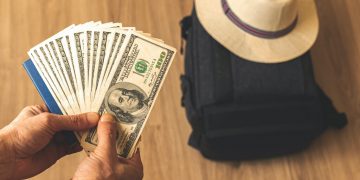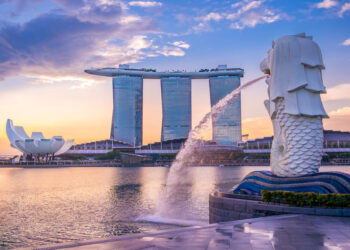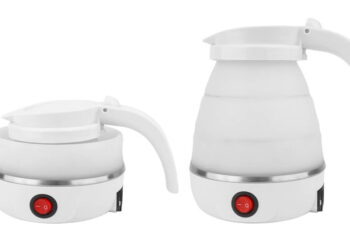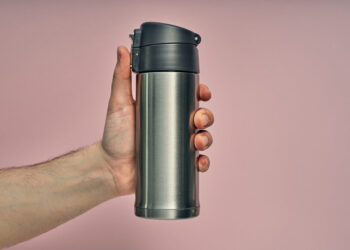Learn the best ways to stay safe traveling during the COVID-19 pandemic by following the below 44 travel tips.
With travel still not yet reaching the pre-pandemic levels, there are still plenty globally who need to travel in 2022, whether for reconnecting with family and friends, caring for loved ones, urgent business needs, or for mental health benefits of getting time away to relax.
Travel safely by incorporating the below tips into your travel plan, and remember that while there is varying scientific evidence on the different precautions you can take, the peace of mind and reduced anxiety you can gain by taking extra precautions can more than makeup for the effort.
Before You Travel
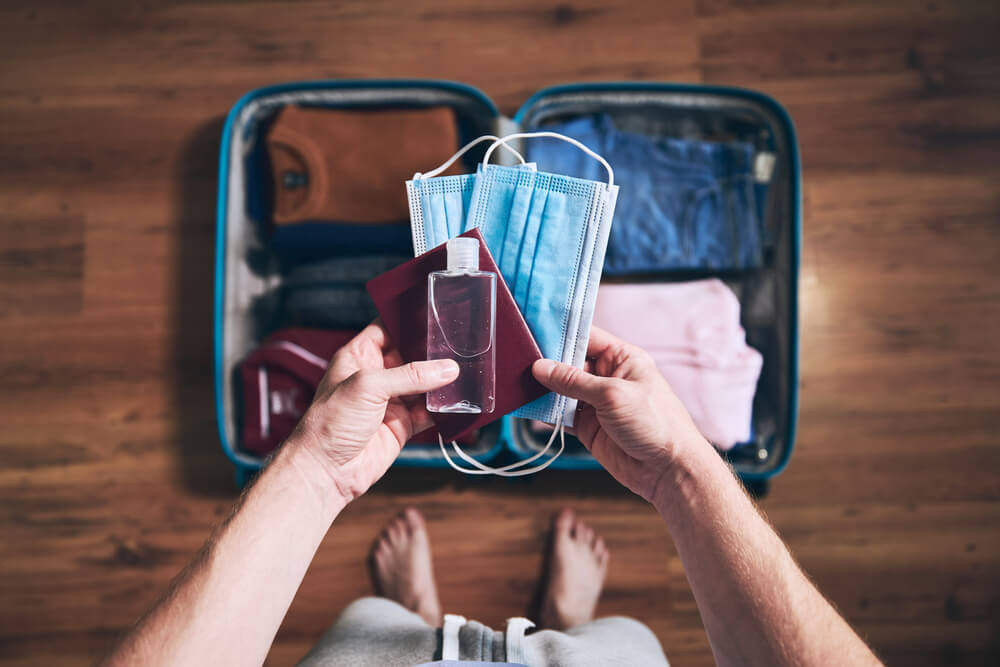
1. Decide if You Really Need to Travel
You will be accepting some level of risk by traveling, so if you don’t need to make the trip, especially if the cases are high at the destination, reconsider if you really need to make the trip or can put it off to a later date.
2. Get Vaccinated
Make sure you are up to date on your vaccination schedule, including any boosters. While this has become a controversial topic, the science is clear; vaccines provide an overwhelming level of protection against the virus. In addition, the vaccine protects you against severe symptoms and possible death, as well as your loved ones.
If you’d like to learn more about the effectiveness of vaccines, consult your government health agency’s vaccine information like the CDC’s COVID-19 Vaccine Effectiveness page.
3. Book Flexible Reservations
Whether you are booking flights, hotels, car rentals, cruise itineraries, or rail reservations, having more flexibility during the pandemic has made navigating the dynamic changes we have seen far easier.
Given the speed of changes that have taken place with new variants, paying an additional premium for flexible reservations can save you money if you decide to cancel or postpone your trip.
4. If Possible, Book For Convenience and Comfort When Flying
If you can spare some extra money or even book with miles, consider the splurge for extra space and comfort by booking premium seats for air travel. Whether it is first class, business class, or premium economy, the extra space will go a long way for your comfort and reduce anxiety if you can afford it.
5. Shorten Your Time in Lines While Traveling
The convenience of the curbside pickup offered by rental car companies can help get you away from others and on the road fast. In addition, priority boarding lines that come with premium airfares or add-on fees can minimize your time in line at the airport. Anywhere you can cut out time spent in line will limit your exposure to other people and possible infection.
6. Know Your Change or Cancellation Policy for Reservations
If you have already booked or are about to book, keep close track of the change or cancellation policies and the deadline to take action. Add reminders to create alerts on your phone or where you keep track of appointments to make sure you don’t overlook the deadlines.
7. Confirm the Testing Requirements Where You are Going
Covid-19 tests have become commonplace before or after your travel, with some countries, airlines, cruise ships, or resorts requiring tests within a specific time before arrival. There are also differences in testing methods between PCR, rapid PCR, rapid antigen tests, and differences between home and certified tests. Confirm you are getting the right one at the right time to make sure you will not fast any hassle at the airport or your destination.
8. Check the CDC or Health Authority’s Travel Guidelines
Make sure you know the CDC or your government health authority’s travel guidelines to consider the current risks of travel to your expected destination. Given the dynamic change of case counts with the virus and the variants, changes in risks can be quick and severe, so staying up to date when deciding about possible changes or cancellations is essential.
9. Buy the Right Masks
Trust the science when choosing masks for your trip. Though the guidance has evolved as the pandemic has, the current recommendation from Johns Hopkins Medicine and many other authorities is that N95 and KN95 masks offer the best level of protection.
If these masks are unavailable, confirm the types of masks allowed on your airline or at your destination. Due to studies showing reduced effectiveness, cloth masks are now not being accepted for use in some places.
10. Confirm Your Hotel’s Cleaning Practices as it Relates to Covid
As cleaning practices and standards have evolved with the pandemic, sizeable global hotel chains have significantly upgraded their company-wide procedures. While there is no need to avoid smaller or independent hotels by default, confirm their cleaning procedures before booking to ensure it follows best practices appropriate for the pandemic.
11. Book Airline Seats in Empty Rows or With Empty Seats Beside You
Though there is no guarantee that the seats won’t fill up, many airlines and routes have operated below capacity throughout the pandemic. This allows travelers to opt for seats without other passengers nearby. Consider rechecking your seat selection before check-in, and even ask to be moved to a less crowded part of the plane at the check-in counter.
12. Agree on The Precaution Measures and Expectations With All Members of Your Traveling Party Upfront
If you are vaccinated and getting a booster along with taking a test before your trip, you most likely expect that the group you are traveling with would do the same. Whether traveling with a group of friends or getting together with an extended family, it’s better to discuss the precautions you are expecting the group to take upfront.
The gaps in expectations or follow-through on precautions can easily create tension or conflict when you find out as a surprise that others didn’t take follow the same best practices on the date that the group comes together.
Discuss any vaccine expectations and testing requirements before the group comes together and make sure everyone agrees.
At the Start of Your Journey
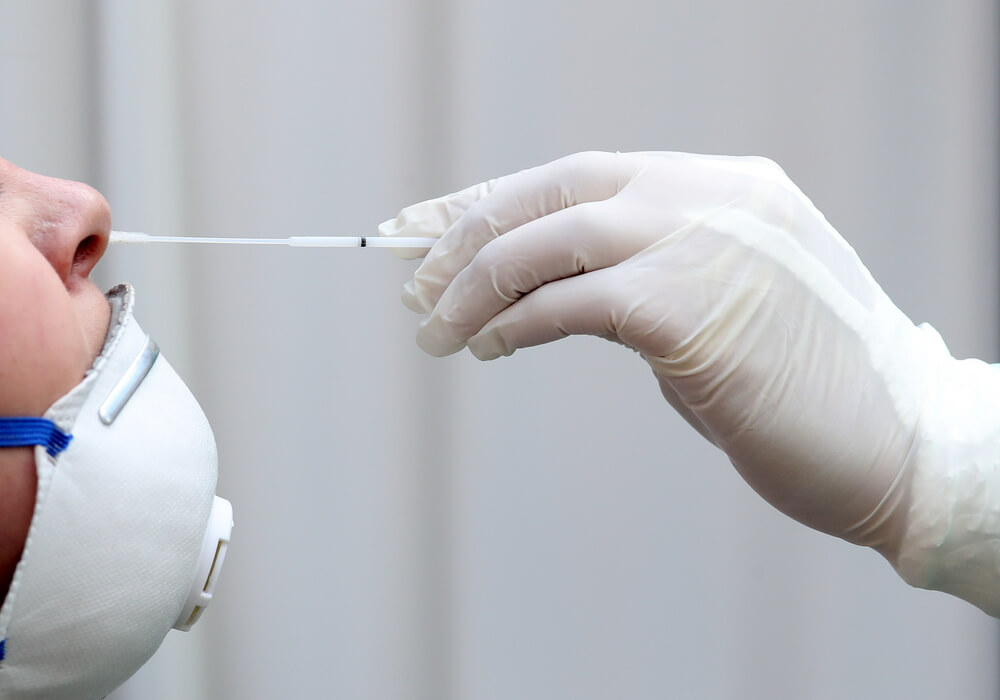
13. Don’t Forget the Basics
The same advice from the pandemic’s start still holds two years in, especially for travelers who come in contact traveling with a higher number of people than their typical daily routine.
- Wash your hands when possible
- Sanitize your hands when you can’t wash them
- Wear a mask when in public places
- Don’t touch your face
- Social distance from others where possible
14. Know the Covid-19 Case Rates of Your Home Area and Destination
Check the Johns Hopkins Coronavirus Research Center to know the status of where you live and where you are going. This is helpful information in determining the risks of where you will travel to and the possibility of sudden changes to restrictions on your entry, especially for international travel where you could be blocked from entry into a country.
15. Reconfirm All of Your Booking Details and Travel Requirements Before
While the tips mentioned above may help you through your booking process, it’s necessary to reconfirm any possible changes to the travel requirements for airlines, hotels, or international travel before your trip. In addition, sudden changes to the virus situation can cause sudden changes to the travel requirements for testing, quarantine, etc.
16. Do Not Travel When You Are Sick or Show Any Symptoms
Beyond being considerate to your fellow travelers and those you encounter along the way or risking further spread, traveling while sick, or showing symptoms runs the risk of getting you caught up in unexpected situations, like being restricted from entry if traveling internationally.
If you have made flexible arrangements, this is the time to use them, cancel the trip, or move the dates out.
17. Consider Tests For Yourself and Travel Companions
To expand on the last tip, even if there is no requirement for you to get tested as part of your travel plans, getting tested before a trip can help ensure that you won’t have a surprise when you or one of your party gets sick at your destination. This could end up being an inconvenience with your plans or even a significant health scare, depending on the severity.
COVID-19 Travel Tips for Flying During the Pandemic
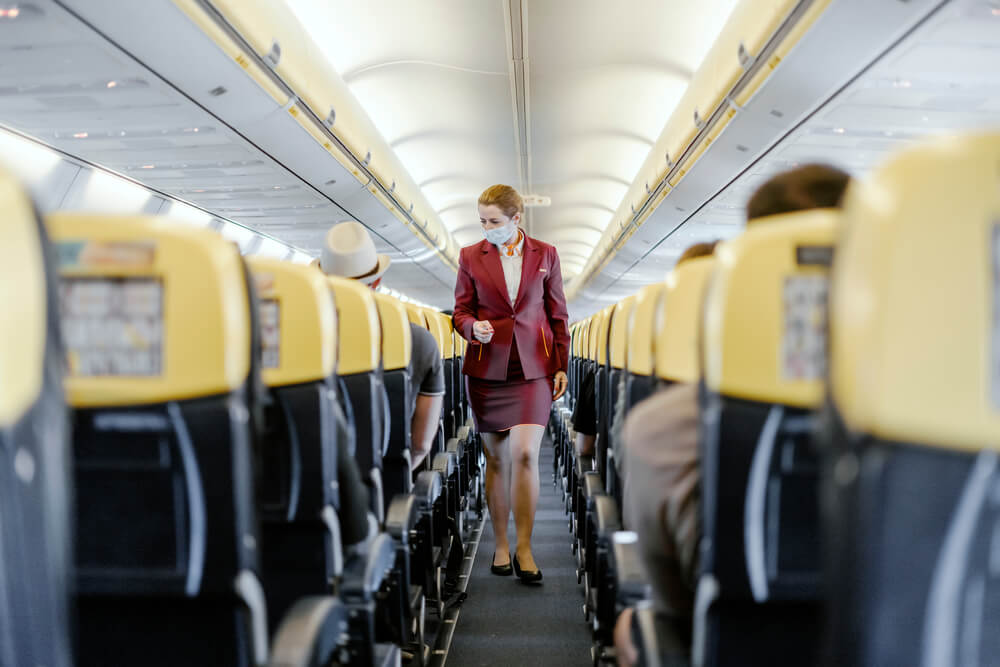
18. Socially Distance Yourself at the Airport
Don’t see the time during flying as an inevitable risk and let your guard down through the whole process; make an effort to lower your risk by limiting contact to others where possible, especially being too close to others.
While the check-in process and security screening require you to stand in line and get closer to others, after you complete these, it is better to get away from the high traffic areas near shops and restaurants to where you will be further away from others.
19. Wait for your flight at a Nearby Empty Gate
While this might not be possible during peak hours at domestic terminals, some terminals will have completely empty gates nearby your own. These make for a great place to relax and reduce any anxiety or stress, or more likely avoid the other anxious passengers sitting closely and waiting for your flight.
20. Eat and Drink Before You Board
Forget your old flight routine of eating and drinking onboard to pass the time; where possible, eat before your flight, preferably at an empty gate at the airport away from others while you take your mask off. This will help avoid taking off your mask in-flight due to the need for a snack or drink.
21. For Longer Flights Skip Meal Service and Opt for Snacks
It’s likely not practical for many of us to not eat during 10, 12, or 15-hour transcontinental flights, so lower your exposure by bringing your own snacks to enjoy at a different time than the mealtime. When the meals are served, the other passengers will be taking off masks simultaneously. While the possibility of in-flight transmission is considered low for the virus, it’s still a worthwhile precaution, especially if you aren’t a huge fan of airline food.
22. Go to the Bathroom Before Boarding
Avoid unnecessary trips to the bathroom to limit exposure to others on shorter flights. While it may be realistic to not go at all on longer flights, it’s still a best practice to cut down on having to go soon after take off.
23. Avoid Dehydration
There needs to be a balance in limiting bathroom trips and avoiding dehydration, so you need to find a way to strike the right balance while you are flying. Make sure you are hydrated before you head to the airport. Not only is hydration is essential for overall health, but it is also critical to a healthy immune system to fight the virus.
24. Limit Items in Your Carry-on if Possible
Avoid the unnecessary unpacking and repacking of your carry-on at the security checkpoints by limiting the items you can be required to take out and repack. Instead, pack simply with your carry-on and check a bag if you have the allowance; this will help speed you through the security checkpoint area and help you get to your seat faster after boarding.
25. Pack Essentials in Your Carry on Bag if You are Traveling Internationally with Connections
It’s possibly contradictory with the last tip. Still, with frequent cancellations, rapidly changing regulations, and government policies, it’s best to be prepared for an extended layover in an airport, even if you expect a quick connection.
Make sure you have a change of essential clothing, medication, and any toiletries that you think you would need when stuck in an airport terminal overnight. Given the dynamic nature of the pandemic and its impact on travel, pack more conservatively for a possible delay than you would have before the pandemic.
26. Don’t Forget The Covid-19 Carryon Essentials
Make sure you pack the essential items that everyone has needed through the pandemic; you don’t want to be caught short-handed of these in-flight or while traveling.
- Hand sanitizer
- Extra masks
- Disinfectant Wipes
27. Don’t Rush to Get in Line and Be Crammed in the Jetway
Especially with assigned seats, there is no need to pack into a jetway and be crammed next to other travelers with limited air circulation. If you follow the previous tip of limiting your carry-on baggage, you won’t need to rush to secure some precious overhead bin space.
28. Point the Ventilation Nozzle Above You at Your Head
The cleanest air comes from it, and it creates an invisible cone of air as it comes out. This helps create a small barrier of air above you that will blow away air particles within the cabin before they can reach you, creating yet another layer of protection while in-flight.
29. Only Wipe the Buttons and Tray Tables if You Need To
While the most likely transmission of the virus through the air, many of us have gotten used to wiping things down for extra safety during the pandemic. It’s easy to feel the urge to wipe everything down after you board, especially if you see others doing it, but it’s also worth considering how much you will need the tray table. If you have a short enough flight, you can consider leaving it alone and not using it.
Tips for Your Destination
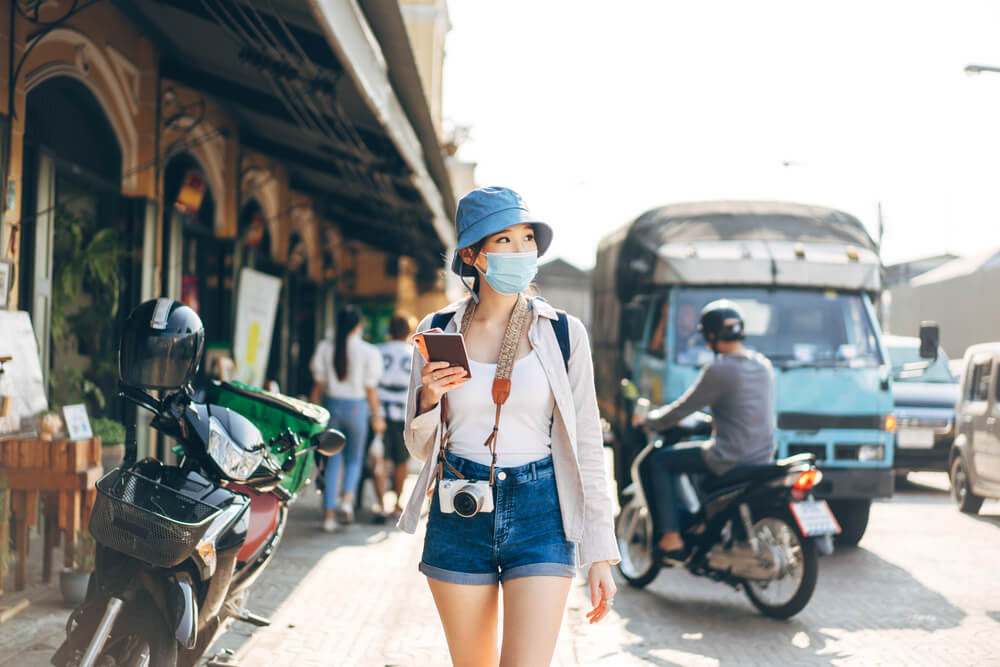
30. Avoid Indoor Spaces
The pandemic has made natural scenery and the outdoors the best options for sightseeing; even if you are visiting a city, enjoy as many walks as you can outside, take in the architecture, skip museums, theme parks, or indoor venues if you can.
31. Consider Skipping Dine-In Restaurants Where Possible
Between the risks of indoor dining and different restrictions on restaurants remaining open completely, consider ordering takeout or delivery if possible.
Opt for outdoor dining where you can and when the weather allows. This was an early solution during the pandemic, and many restaurants are still offering tables outside as an option.
Alternatively, there has never been a better time to enjoy an outdoor or hotel picnic by gathering fresh ingredients or locally prepared foods for enjoyment in your hotel room.
32. Buy Tickets to Sights Online
Avoid the need to enter ticket offices or interact more with other people than you need to by purchasing tickets to parks or attractions online if available.
33. Don’t Limit your Sleep
Sleep benefits overall health, and with the challenges of getting rest combined with jet lag and a busy schedule, make sure you find enough time to sleep. In addition, take naps where needed to make sure you get enough rest to maintain a healthy immune system.
Ways to Stay Safe At Your Hotel or Vacation Rental
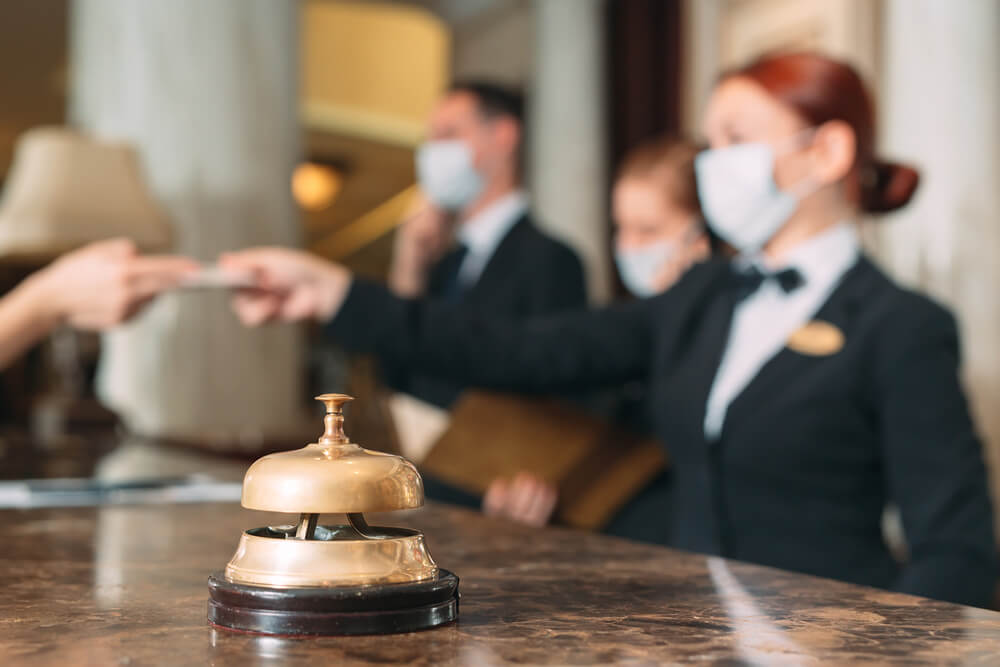
34. Ask for a Room that Has Been Vacant for a Few Days
The scientific evidence is still out on transmission through surface exposure and how long the different variants of the virus can survive on different materials; however, a straightforward request is to ask for a room that hasn’t been occupied for a few days. This will provide an extra level of protection and peace of mind.
35. Avoid Using Public Facilities like the Gym or Pool
While staying at a hotel may be a necessary part of traveling, using the public facilities in the hotel is not. Skip the gym or pool and head outside for a walk or run, or use the room for an in-room yoga session or workout.
36. Open Windows or Balcony Doors for Extra Ventilation
Where the temperature and building allow, open your windows and balcony doors to provide additional ventilation. Internal air circulation from other rooms in poorly ventilated buildings has been known to spread the virus, so extra ventilation is always a best practice.
37. Consider Bringing Your Own towels or Pillowcases
With many hotels upgrading their laundry and cleaning practices during the pandemic, there can be a benefit of peace of mind by bringing your own towels or pillowcases where luggage space allows.
38. Keep Your Room on Do Not Disturb
Skip the housekeeping and turndown services to avoid unnecessarily having other people in your room during your stay by keeping your do not disturb light or door sign up. Skip the services, especially for short stays where cleaning the room each day is both unnecessary and not environmentally friendly.
39. Confirm Cleaning Practices With your Vacation Rental Manager
While many vacation rentals cater to the higher expectations of cleaning standards during the pandemic, it’s still worth confirming what their practices are before you book or even at arrival.
Ask the host if there is a gap between guests. Then, when you arrive, you can open windows and doors to ventilate and even wipe down high-touch surfaces as an extra layer of safety.
40. Have a Hotel Picnic or Room Service
Skip meals in the hotel restaurant by opting for room service, or better yet, enjoy a hotel picnic with local foods from the market or stores specializing in local dishes. This will allow you to both relax and also avoid any unnecessary exposure.
COVID-19 Travel Tips For Traveling by Car
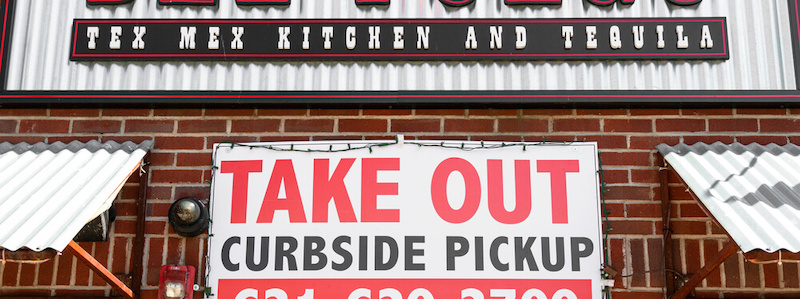
41. Bring Plenty of Snacks and Drinks With You
Limit unnecessary stops and reasons to head into convenience stores. By fully stocking up on any preferred snacks and drinks before your trip, you won’t feel the urge to pull over and run indoors, avoiding being closer to others if not needed.
42. Wipe down the Nozzle and Keypad When Filling up Gas Tank
High-touch surfaces at the gas pump have long been a breeding group for germs. By wiping them down before use and using hand sanitizer after, you will reduce the risk of picking up something by accident at the pump.
43. Use Drive-Thru Restaurants or Curbside Pickup Where Available
Cut the risk of exposure from dining in a restaurant by having your meal in your car or taking it to an empty part of a parking lot to tailgate. In addition, many fast food and casual restaurants have been offering curbside pickup services since the start of the pandemic, making it easy to order food via mobile phones from outside or on the way to a restaurant, saving time on your journey.
After Your Return Home
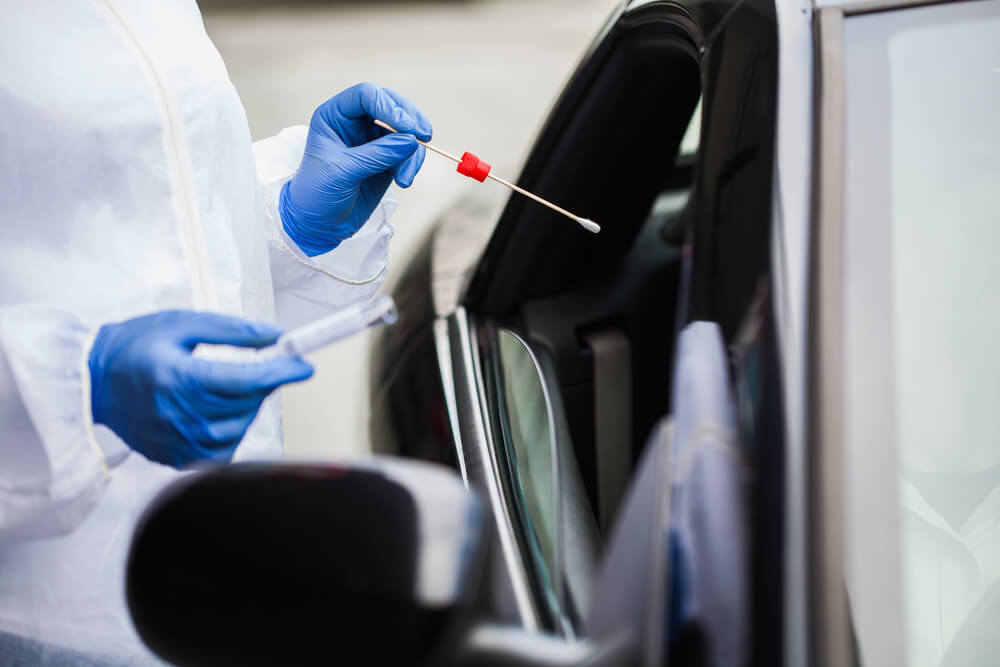
44. Self-Quarantine and Test Upon Return
The CDC recommendation is for unvaccinated travelers to quarantine for at least five days after returning from traveling and for all travelers to test within 3-5 days of returning home.
As a best practice, and if it doesn’t disrupt your work or school schedule, consider extra days quarantining even if you are vaccinated.

